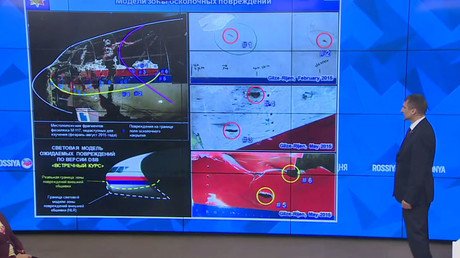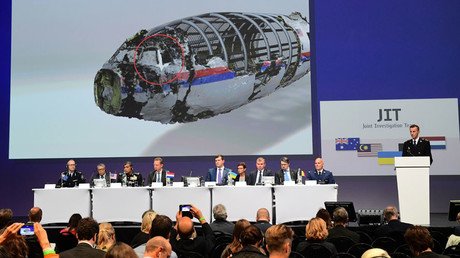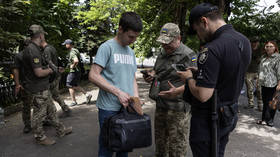MH17 shot down by rebels using Buk system brought from Russia – int’l investigators
A Dutch-led team of international investigators has released its findings on the MH17 crash, concluding the plane was shot down by rebels in eastern Ukraine, using a Buk missile system “brought from Russia.” The investigators, however, did not directly link Russia “as a nation” to the incident.
The Joint Investigation Team (JIT) consists of investigators and experts from the Netherlands, Belgium, Australia, Malaysia and Ukraine. The team was tasked with determining who was responsible for the incident in which Malaysia Airlines flight MH17 crashed in eastern Ukraine on July 17, 2014.
"Based on the results of the criminal investigation, it may be concluded that flight MH17 was shot down on July 17, 2014, by a 9M38-series missile from a Buk missile launcher and [it] was brought from the territory of the Russian Federation and after launch subsequently returned to the Russian Federation territory," said Wilbert Paulissen, the director of the National Criminal Investigation Division of National Police of the Netherlands.
However, the criminal investigation has not directly linked Russia to the downing of the plane, Dutch chief-prosecutor Fred Westerbeke said.
“We have determined that the weapons came from the Russian Federation. Having established this, we do not make statements about the participation of the Russian Federation as a nation or people from the Russian Federation,” the official said as cited by RIA Novosti.
The report by the JIT says the findings on the Buk's route from Russia are based on various sources, including “intercepted telephone conversations, witness statements, photographs and videos that had been posted on social media.”
#MH17 press conference #Hollandpic.twitter.com/SZtNQSAsjt
— Paula Slier (@PaulaSlier_RT) September 28, 2016
The Dutch-led Joint Investigative Team says that a technical problem or an “attack within the aircraft,” such as a terrorist assault, can be ruled out.
“An accident and evidence for a terrorist attack from inside the aircraft have been ruled out. Results from the forensic investigation support the scenario of an attack from outside the aircraft,” the JIT said in the report published on Wednesday following the official presentation.
More than 102 investigators / half a million videos and photographs / more than 200 witnesses / 150 000 intercepted phone calls
— Paula Slier (@PaulaSlier_RT) September 28, 2016
No other aircraft could have shot down the plane either, the JIT concluded.
The JIT presented an audio recording that allegedly proves that rebel forces voiced a need for a Buk missile system, and subsequently received one.
9M38 missile brought down #MH17 - #BIT conference
— Paula Slier (@PaulaSlier_RT) September 28, 2016
According to the JIT, the team investigated the claims by Russia that the plane was shot down from the village of Zaroshchenskoye, held by Ukrainian forces. Citing an alleged audio interception of the rebels, the JIT concluded that the missile did not come from that territory.
International investigators instead say that flight MH17 was shot down from the village of Pervomayskoye (Pervomaiskyi), held by rebel forces at the time of the incident.
The findings are “being backed by the US data, which evaluated that the launch site was located 6km south to Snezhnoye,” which at that time was controlled by rebel forces, the JIT says.
About 100 people could be linked to the alleged transportation of the Buk missile system to eastern Ukraine and the missile launch, the JIT announced. There should however be a further investigation, the team added.
According to the JIT, it is not clear how long it will take for investigators to establish the exact roles of the people allegedly linked to the incident.
The JIT added that it is also not clear whether the downing might have been a mistake. However, according to some audio recordings, “people were surprised” after it was revealed which plane had been brought down, the JIT said.
During the press conference on Wednesday, the investigators said they did not have an opportunity to analyze new Russian radar data on the incident.
Almaz-Antey, which produces the Buk missile system, said last week that it handed over raw radar data from the airspace around the crash site of MH17 on the very day of the tragedy. The radar, located in Russia, had not spotted any objects that came from the rebel-held territories towards the crashed jet, the radar producer said.
The JIT says that the radar images provided by Russia will be reviewed by the investigation team.
Over the course of the further inquiry the Dutch-led investigators said they will consider other documents recently provided by Almaz-Antey.
“The JIT received the results of the experiments conducted by ‘Almaz-Antey’ just several weeks ago and has not managed to review them yet.”
Results of MH17 inquiry ‘biased, politically motivated’ – Moscow
Following the release of the preliminary JIT report, Almaz-Antey conducted a press-conference dismissing the results of a probe into the causes of the MH17 disaster which was conducted by international investigators.
The Russian arms producer, citing three of its own experiments, stated that the plane was more likely to have been shot from somewhere in the region of the village of Zaroshchenskoye, which was held by Ukrainian forces at the time of the crash.
It said that the destruction of the cockpit suggested the missile approached from a different direction than that stated by the JIT. Almaz-Antey also pointed towards an experiment in which is said it proved the missile type which hit MH17 had been decommissioned by the Russian military years ago.
The Russian MoD said that “Russian missile systems including ‘BUK’ have never crossed into Ukraine". It went on to say that the findings of the JIT are based on Ukrainian intelligence and internet sources, while such serious allegations against Russian require rock-solid facts.
Yet Russia will do everything necessary to cooperate with the Dutch-led team to establish the true culprits of the MH17 crash, according to the spokesperson for the Russian Defense Ministry General Igor Konashenkov
On Wednesday the Russian Foreign Ministry voiced its frustration with the results of the international report on the crash.
"Russia is upset that the situation around the MH17 crash inquiry is not changing,” the Ministry’s spokesperson Maria Zakharova said.
“The results of the Dutch prosecutors confirm that the inquiry is biased and politically motivated.”
Zakharova also noted that while Russia’s input has been largely ignored, Ukraine “has been made a full member of the Joint Investigative Team, giving it an opportunity to falsify evidence.”
Ukraine and its foreign sponsors repeatedly accused Russia of arming and supporting the rebels, an accusation that Moscow denies. Almost immediately after MH17 was downed, Western media and some governments blamed Russia, claiming Moscow had either provided the Buk system to the rebels or sent its regular troops to take down Ukrainian warplanes on their behalf.
Russia denied the accusations on numerous occasions. It also challenged Kiev’s claims that Ukraine had neither warplanes nor Buk systems in the area by producing public satellite and radar images showing evidence to the contrary.
WATCH MORE:













